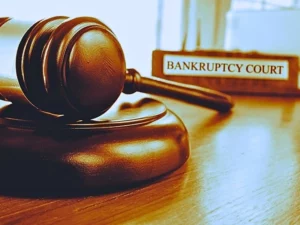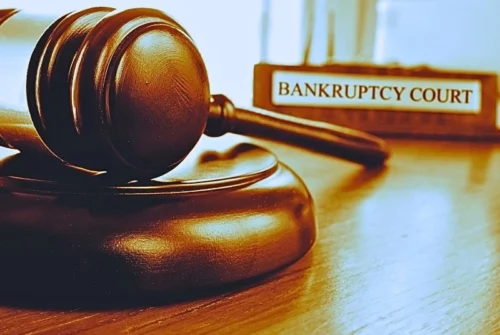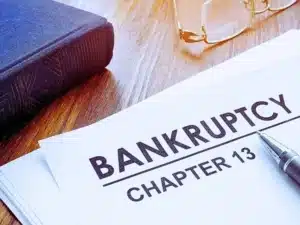
What Is Bankruptcy?
Struggling with debt repayment can leave you wondering: What is bankruptcy? Bankruptcy is a legal petition initiated in a federal court when an individual or business cannot afford to pay financial obligations. Filing bankruptcy in Nevada automatically stops all collection efforts by creditors, such as phone calls, foreclosures, wage garnishment, and most pending civil cases.

Depending on your unique financial situation, you can file either a Chapter 7 or Chapter 13 bankruptcy. A bankruptcy lawyer who understands federal and state laws can advise you on the best type of bankruptcy for your financial situation. Your lawyer will fight to protect your assets while discharging most of your debt.
How Does the Bankruptcy Process Work in Nevada?
The decision to file for bankruptcy is a big step, and there is much to consider before filing. It’s important to know the answer to the question, “how does bankruptcy work?”
Once you file, creditors must halt all collection efforts, including foreclosure, repossession, and wage garnishment. Only certain types of debt can be included in bankruptcy. Depending on how you choose to file, you may need to repay a portion of what you owe. This portion is based on your financial situation, as well as your assets. Remaining debt will be discharged, meaning you no longer have any obligation to pay it. However, there are consequences surrounding bankruptcy that must be taken into consideration. A bankruptcy lawyer can help you understand these consequences and discuss your options.
What Are the Pre-Filing Requirements?
You must complete a credit counseling course before filing either Chapter 7 or Chapter 13 bankruptcy in Nevada. This course exposes you to all available debt relief options and ensures you know the impacts of filing bankruptcy.
You must do the course in a state-approved agency. You can do it via a phone call, online, or in-person. The agency will issue you with a certificate once you complete the course.
You must submit this certificate along with other bankruptcy forms to the court. The certificate is only valid for 180 days. So, you must file bankruptcy within six months of finishing the course.
You must also pass the means test to qualify to file Chapter 7 or Chapter 13 bankruptcy. This test constitutes two parts to assess whether you have the financial capacity to clear your debts partially or even fully.
The first part of the test weighs your monthly income against median income for a household like yours. You are automatically eligible for Chapter 7 if your income is below the median. You will not need to proceed to the second part.
The second part will be necessary if your income is above the median. This part determines the amount of your disposable income by deducting regular living expenses, priority debts like child support, and secured loans like motor vehicle loans. You will qualify for Chapter 13 if your disposable income is sufficient to pay 25% (or more) of your unsecured debts.
You also need to know how many bankruptcies you can file in Nevada. This is because waiting times apply between filings.
Gathering Necessary Financial Documents
Assembling and completing the necessary financial documents are crucial steps in the bankruptcy process. Obtain tax returns for the past two years (four years for Chapter 13) and latest statements for any of your transactional or saving accounts.
Get payslips or other records documenting your earnings for the last two months. Alternatively, you can prepare a list of all your earnings for the past 60 days.
A credit report from a recognized credit reporting bureau is also necessary. This report will help you document names and contact information of all your creditors.
Listing all Your Creditors
This step involves creating a creditor matrix. The matrix allows the bankruptcy court to identify your creditors and let them know you are initiating bankruptcy proceedings. All your creditors must appear on this matrix, regardless of the amount you owe those creditors. If you do not include a debt on your matrix, the creditor will not get notified that you are filing bankruptcy. Additionally, the debt may not get discharged after a successful bankruptcy proceeding.
Filing the Paperwork
You can file the paperwork with the U.S. Bankruptcy Court in Reno or Las Vegas. You can do it by submitting the filled out documents to the court in person, by mail, or through the e-filing system. Your lawyer can assemble all the necessary documents, ensure they are properly filled out, and file them with the relevant court on your behalf.
Trustee Appointment and Automatic Stay Issuance
The court will appoint a trustee to oversee your estate soon after you file your paperwork. The court will then review the paperwork and issue an automatic stay. This stay bars property repossessions, foreclosures, evictions, and debt collections. It also stops any calls from creditors or collection agencies regarding your debts.
IRS investigations, criminal cases, and child support or spousal support lawsuits will proceed even after the court issues an automatic stay. Creditors in foreclosure cases can request the court to lift the stay to allow the foreclosure process to continue.
The trustee will assess your assets and sell any non-exempt assets to pay your creditors. The trustee will prepare a “no asset” report if all your assets are exempt. This report means you do not have assets to sell to repay your creditors.
The Meeting of Creditors
The trustee will set up a creditors meeting 21 to 50 days after filing bankruptcy. You will be put under oath and asked several questions by the trustee and your creditors. The questions may include whether you have disclosed all your assets, named all your creditors and corresponding debts, and provided accurate documents.
Discharge of Debts
The trustee will start selling non-exempt assets and use the proceeds to repay eligible creditors. The trustee will then inform the court that the bankruptcy process is over. The court will give a notice of discharge of debt, prohibiting any debt collection attempts by creditors.
Some debts are non-dischargeable in bankruptcy. These debts include student loans, outstanding taxes like income tax arrears, unpaid child support and alimony, and civil damage awards.
The bankruptcy process has many requirements. As such, you need to know what questions to ask a bankruptcy lawyer to better your chances of hiring the best one for your unique situation.
Types of Bankruptcy in Nevada
In Nevada, individual consumers can file bankruptcy either under Chapter 7 or Chapter 13. Chapter 11 bankruptcy is reserved for business filing.
Chapter 7 Bankruptcy
The court will assign a trustee to your case once you file Chapter 7. The trustee will seize and liquidate assets above the permitted exemptions to pay off your creditors. You must have resided within Nevada for two years or more to be eligible for these exemptions. Assets that are within permitted exemptions in Nevada include:
- Home equity not exceeding $605,000
- Automobile equity not exceeding $15,000
- Your preferred personal property of up to $10,000
- Art and Jewelry worth $5,000 or less
- Household items like appliances and electronics of up to $12,000
- Income tax refunds and public debts
At the end of the bankruptcy case, your unsecured debts like medical bills, credit card debt, and outstanding utility bills will get discharged. Your creditors will get their percentage of your cashed-out non-exempt assets or property.
Filing Chapter 7 bankruptcy will cost you $335 in filing fees.
Chapter 13 Bankruptcy
Filing a Chapter 13 bankruptcy can protect you if you have a house or a car to protect from foreclosure or repossession. It restructures your debts as per a court-authorized repayment plan. In other words, it allows you to retain your non-exempt property by making payments over a long duration, typically three to five years.
You will suggest a monthly repayment plan that suits your current financial situation. Creditors can agree or disagree with your plan. Be sure to negotiate with the help of your bankruptcy lawyer if your creditors are unhappy with your repayment plan.
You must have a reliable income source to qualify for a Chapter 13 bankruptcy. The reason is that this bankruptcy option requires you to comply with the court-approved repayment plan. Filing fees for a Chapter 13 bankruptcy are about $310.
What Are the Consequences of Filing for Bankruptcy?
Despite giving you a fresh start if you cannot pay off your debts, filing bankruptcy in Nevada carries several consequences. Knowing these consequences allows you to make an informed decision regarding entering bankruptcy.
Limited Credit Access
Filing bankruptcy lowers your eligibility for new credit. Loans you can access will also attract high interest rates. You may remain ineligible for a home loan for up to four years if you filed Chapter 7 bankruptcy, and up to two years if you filed Chapter 13.
Tax Refund Loss
You will still qualify for tax refunds after entering bankruptcy. Your refund may, however, go towards covering your federal tax arrears. It may also be sent to your trustee in a Chapter 7 bankruptcy to pay off other debts.
Loss of Assets
Non-exempt assets in Chapter 7 are sold to repay your creditors. You may lose your assets in Chapter 13 if you fall behind the court-approved repayment plan.
Does Bankruptcy Impact Your Credit Score?
Bankruptcy takes a toll on your credit score for several years. Filing bankruptcy proves that you are struggling financially and unable to repay your debts on time.
You could lose 130 to 150 points if you file bankruptcy with an average credit score of 680 points. You could also lose up to 240 points if you have an above-average score of 780.
A Chapter 7 bankruptcy will remain on your credit report and impact your score for ten years. A Chapter 13 bankruptcy, on the other hand, will linger on your report and affect your score for seven years.





